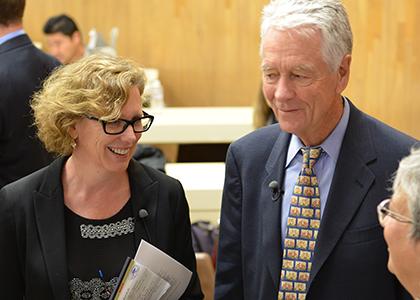
The Frank G. Wells Environmental Law Clinic was born from a simple idea. In 1994, lawyers from the Natural Resources Defense Council along with philanthropist Dan Emmett approached UCLA School of Law. What if, they asked, the law school created a legal clinic where students could work outside of the classroom on behalf of community groups to help enforce environmental laws?
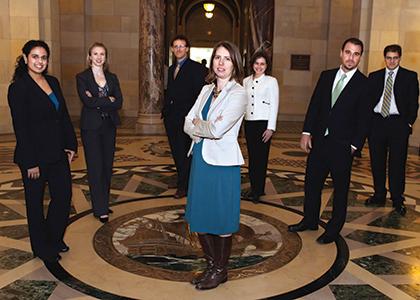
The class gained experience working with real clients while solving actual environmental problems. That has been a winning formula for the last 30 years for the clinic, which was named to honor Wells, a lawyer, entertainment executive and avid environmentalist.
“When this clinic started, the environmental law field was really burgeoning,” says Cara Horowitz, who directs the clinic and serves as the executive director of the Emmett Institute. “Some of the early big environmental statutes in the United States were passed around 1970, so they'd been around for a couple of decades already. But advocates were beginning to feel their way through the use of these statutes in ways that were becoming very meaningful.”
Much has changed over these three decades, as climate change has moved front-and-center for policymakers — and for students. In the early 1990s, only one or two UCLA Law students each year would express interest in an environmental career, Carlson says. Now, UCLA’s environmental law specialization graduates 25 to 30 students per year.
Students in the Wells Clinic work on pressing environmental matters at the local, national and international levels. Over the years, students have provided analysis underscoring the legal basis for L.A. County to phase out oil and gas operations; drafted successful petitions to enforce air monitoring near oil refineries; successfully challenged the grant of a permit for coal mining on Native American lands in Arizona on behalf of Hopi tribal members; and worked through the United Nations on behalf of small island states fighting for aggressive international climate change action.
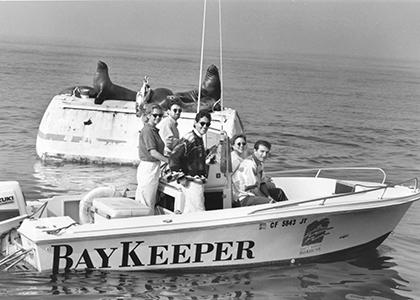
Divya Rao ’21, a managing associate in energy, transportation and infrastructure at Sidley Austin, participated in the clinic in 2018 and worked with Surfrider Foundation. Her project was to put together a briefing booklet for Congress on single-use plastics to help advocate for potential legislation that would aim to reduce plastic pollution. That work sent her to Washington, where she made a presentation to Congress and experienced national politics firsthand.
There was a blizzard on the day that Rao and her clinic team touched down. The 2018 midterms had just handed Democrats control of the House of Representatives. Members of Congress were facing off over a government shutdown, but the students got to work.
“We actually had a panel with Rep. Alan Lowenthal, where we were speaking to a group of staffers and representatives about our conclusions and what we thought the best solution would be,” Rao says. “I thought it was so empowering to be able to, as a law student, speak about something that I'd spent a full semester focusing on and becoming really passionate about and presenting those findings with the hope that that legislation might pass and help Americans across the country.”
The bill that her work inspired, the Break Free from Plastic Pollution Act, is still under consideration and has gained more support as attention to plastic pollution has only grown.
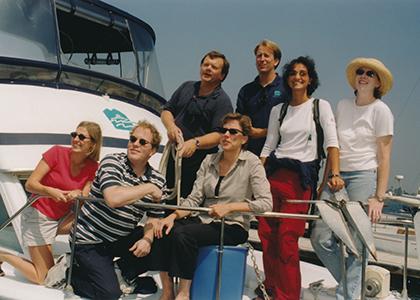
In the decades since the clinic’s founding, many other environmental law programs around the country have followed suit. But there’s something special about operating an environmental law clinic in Los Angeles, Horowitz says. One of the world’s great megacities, L.A. is home to myriad environmental problems but also a lively environmental justice community. The clinic has worked for years with communities in South L.A. and environmental justice advocates fighting lead pollution. Other clinic partners throughout the state have included groups focused on air pollution.
Ben Harris ’16 says that he enrolled in the Wells Clinic during his last semester to ensure that he didn't leave law school without practical experience in environmental justice. He worked on a motion in a California Energy Commission proceeding related to a power plant in Oxnard that was affecting local air quality.
“It was the first time I really was exposed not just to some of the concepts underlying environmental justice and environmental racism but also to communities themselves expressing desires for what they want to see to improve their own communities and environment,” Harris says. “It really was meaningful to me to be able to support the community in having their own voice in the matter.”
Harris went on to become a law fellow at the Emmett Institute and co-teach the clinic. He is now a senior staff attorney for Los Angeles Waterkeeper — yes, the very first organization that partnered with the Wells Clinic 30 years ago.
In April 2024, the U.S. Environmental Protection Agency finalized emissions standards for greenhouse gases from power plants under Clean Air Act, Section 111(d). The rule sets pollution limits for existing coal plants and some new gas plants based on carbon capture and sequestration. In West Virginia v. EPA, some states and industry parties have challenged these new standards.
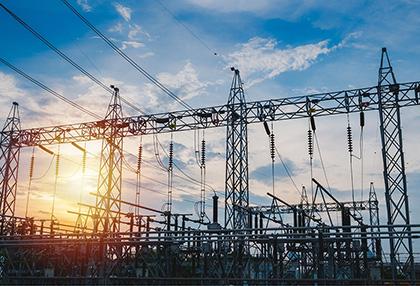
The Emmett Institute on Climate Change and the Environment at UCLA School of Law has launched the Emmett Clean Energy Law and Leadership Project (E-CELL), a hub that will be based at the law school and contribute to the clean energy transition while enhancing the institute’s longstanding focus on energy law.
United Nations Secretary-General António Guterres recently called on all countries to ban advertising by fossil fuel companies. He didn’t single out sports teams, but he could have.
Many major league sports teams in the U.S. have sponsorship deals with some of the companies most responsible for the polluting products fueling climate change. But how many exactly?
-
J.D Environmental Law
The Nov. 5 presidential election will set the course for climate progress for years to come. More than in any previous election, the two major candidates’ track records on environmental policies are well-established and diametrically opposed. Thanks to campaign pledges, party platforms, and written plans by former administration officials, we can evaluate the candidates for what they are likely to do in the critical years ahead.
This panel discussion hosted by the UCLA Emmett Institute will explore the climate implications of the 2024 election from the national and international perspective, as well as a deep dive on how California policymakers are preparing to lead at the state level whatever the next four years bring. What are the environmental policy scenarios in a Trump or Harris administration? What roles do Congress, the Supreme Court, and international partners play in those scenarios? Join us to discuss climate policy after the 2024 election.
Registration:
Webinar registration: https://ucla.zoom.us/webinar/register/WN_r2aw4DE0R4qZh2iI2rMdOA
In-person viewing (UCLA students, staff, and faculty only): https://forms.gle/Vc3SQ9nst5dzsLWG9
Panelists:
Ann Carlson, former Acting Administrator of NHTSA, Shirley Shapiro Professor of Environmental Law at UCLA, and Faculty Director of the Emmett Institute
Julia Stein, Deputy Director of the Emmett Institute
Alex Wang, Walter and Shirley Wang Chair in U.S.-China Relations and Communications, Professor of Law at UCLA, and Faculty Co-Director of the Emmett Institute
Sen. Henry Stern, State Senator representing California's 27th District, and Chair of the Joint Legislative Committee on Climate Change Policies

When Ralph Shapiro died earlier this month, we lost a great alumnus and dear friend. Along with his wife Shirley Shapiro, Ralph has been a longtime supporter and champion of the UCLA School of Law and the Emmett Institute on Climate Change & the Environment.
Heavy duty vehicles, such as large semi-trucks and buses, disproportionately contribute to harmful air pollution, particularly in low-income and disadvantaged communities. They also emit significant greenhouse gases, exacerbating climate change. Fortunately, zero-emission electric versions of these vehicles are on the road today and increasingly available. However, the infrastructure required to support these vehicles is immense.
-
J.D Environmental Law